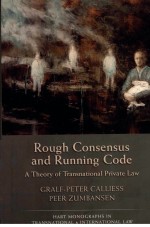

ROUGH CONSENSUS AND RUNNING CODE A THEORY OF TRANDNATIONAL PRIVATE LAWPDF电子书下载
- 电子书积分:13 积分如何计算积分?
- 作 者:GRALF PETER CALLIESS AND PEER ZUMBANSEN
- 出 版 社:OREGON
- 出版年份:2010
- ISBN:1841139742
- 页数:366 页
Introduction 1
1. Law's Elusive Boundaries 11
Ⅰ. Border Crossings 11
Ⅱ. Towards a Legal Critique of Transnational Governance Institutions 17
Ⅲ. Law's Elusive Empire? 19
2. Towards A Theory of Transnational Private Law 27
Ⅰ. Seeing the (Global) World Through a Private Lawyer's Eyes 27
A. Crucial Intersections: Lex mercatoria and Legal Pluralism 28
B. Communities of Interest and Private Governance Regimes:The Conundrum of Transnational Commercial Law 35
C. Markets as Regulators: It's the Economy, Stupid Or, is It? 59
D. Law and the Transformation of State Regulatory Functions 64
Ⅱ. Ubiquitous Law 67
A. Normativity versus Realism: Law versus Power 67
B. The Transnational: A Realm of Borderless Self-Regulation? 76
C. Private Ordering and Public Authority: Scrutinising Democratic versus Economic Functions of Law 80
Ⅲ. A Theory of Transnational Private Law 96
A. Co-ordination versus Regulation: Revisiting the Public-Private Divide 96
B. The Hybrid Character of Transnational Law Regimes 109
C. The Governance Mode of Transnational Law Regimes 112
(ⅰ) Mapping Economic Governance 113
(ⅱ) The Recombinant Governance Mode of Transnational Commercial Law 119
D. Soft Law, Hard Law, and Legitimacy 123
E. Rough Consensus and Running Code 134
(ⅰ) Internet Governance: Legitimising Open Technical Standards 135
(ⅱ) Private Law Harmonisation 139
(ⅲ) Modern Customary Law 143
(ⅳ) The Making of Transnational Private Law 145
3. Transnational Consumer Contracts 153
Ⅰ. Private Ordering in B2C E-Commerce 153
A. Online Reputation 154
B. Trustmarks and Codes of Conduct 155
C. Online Dispute Resolution 157
D. Method of Payment and Credit Security 160
Ⅱ. Transnational Law Regimes: the Role of Virtual Marketplaces 163
Ⅲ. Reflexive Consumer Protection Law 166
A. Reflexive Trustmarks: Contractual Standards of Hybrid Organisations 169
(ⅰ) Secondary Trustmarks at the National L+evel 169
(ⅱ) Supranational Standardisation via Co-Regulation? 170
(ⅲ) Global Linkage 173
B. Law-Consumer Protection: ODR Standards and their Implementation 174
(ⅰ) Guidelines for providers of ODR Procedures 175
(ⅱ) The Implementation of Global ODR Standards 176
Ⅳ. RCRC in the Making of Transnational Consumer Contract Law 179
4. Transnational Corporate Governance 181
Ⅰ. Corporate Governance Codes 181
A. Corporate Governance 187
B. Corporate Governance and Political Economy 189
C. Law-Making in Corporate Governance 194
(ⅰ) The German Corporate Governance Code as an Example of RCRC 196
(ⅱ) Who Makes Company Law? 200
(ⅲ) Corporate Law Making Between State and Society 207
(ⅳ) The Reform of German Corporate Governance: The Intricacies of Rough Consensus and Running Code 208
Ⅱ. Transnational Corporate Governance and Executive Compensation 212
A. The Transnational Embeddedness of European Corporate Governance Regulation 213
B. 'New' and 'Experimentalist Governance' in European Corporate Law Regulation: RCRC as Transnational Legal Pluralism 219
(ⅰ) The Polarities of EU Governance: Global Competitiveness and Political-Economic Integration 220
(ⅱ) Reflexive Corporate Governance 223
(ⅲ) European Corporate Governance Regulation and RCRC 225
C. The Case of Executive Compensation 227
(ⅰ) Breaking the Political Deadlock: Governance by Expertise 230
(ⅱ) Executive Compensation: Governance by Transparency 232
D. 'Germany Inc' and Executive Compensation 234
(ⅰ) The Political Economy of Corporate Governance Reform in Germany 236
(a) Governing 'Germany Inc' 236
(b) Hybridisation of Law-Making: The Return of the State? 240
(ⅱ) Transnational Corporate Governance as Spatio-Temporal Assemblage 242
E. Transnational Corporate Governance Regulation as RCRC 246
5. Rough Consensus and Running Code in Context 248
Ⅰ. Law and Social Norms 248
Ⅱ. Soft Law 255
A. Asking the Right Questions? 255
B. Soft Law as Embarrassment 258
Ⅲ. Customary International Law (And Its Limits) 261
A. Elements of Customary International Law 262
B. Ships Passing in the Night? 265
C. The Attack on Customary International Law 266
D. Customary International Law in the Making of Global Law 270
Ⅳ. Transnational Private Law: Hard Law, Soft Law, Reflexive Law and the Conditions for Private Law-Making 274
Bibliograpby 278
Index 347
- 《心脏病学 心血管内科学教科书 第9版 英文影印版 下》(美)Robert O.Bonow,Douglas L.Mann Douglas, P.Zipes Peter Libby主编 2013
- 《心脏病学 心血管内科学教科书 第9版 英文影印版 上》(美)Robert O.Bonow,Douglas L.Mann Douglas, P.Zipes Peter Libby主编 2013
- 《面向负荷的生产控制 理论基础、方法与实践》(德)(H.-P.温达尔)Hans-Peter Wiendahl著;肖田元等译 1999
- 《营销调研》(美)P·M·奇兹诺尔(Peter M.Chisnall)著;乔慧存,李新民译 1998
- 《洛克伍德-威尔金斯儿童骨折 第7版》(美)James H.Beaty,James P.Kasser,David L.Skaggs,John M.(Jack)Flynn,Peter M.Waters原著;黄耀添,颉强,赵黎,雷伟主译;王林,吴子祥,杨柳,蔡奇勋,陈珽,杨璇副主译;裴国献主审 2014
- 《PROSPECT THEORY FOR RISK AND AMBIGUITY》PETER P.WAKKER 2010
- 《DIAGNOSIS OF DISEASES OF THE CHEST VOLUME 2 THIRD EDITION》ROBERT G.FRASER J.A.PETER PARE P.D.PARE RICHARD S.FRASER GEORGE P.GENEREUX 2222
- 《PERFORMANCE ANALYSIS OF LOCAL COMPUTER NETWORKS》JOSEPH L.HAMMOND PETER J.P.O.REILLY 2222
- 《An introduction to human anatomy》Green;John Herbert.;Silver;P. H. S.;(Peter Hele Spencer) 1981
- 《INTELLECTUAL PROPERTY IN THE NEW TECHNOLOGICAL AGE REVISED FOURTH EDITION》ROBERT P.MERGES AND PETER S.MENELL 2007
